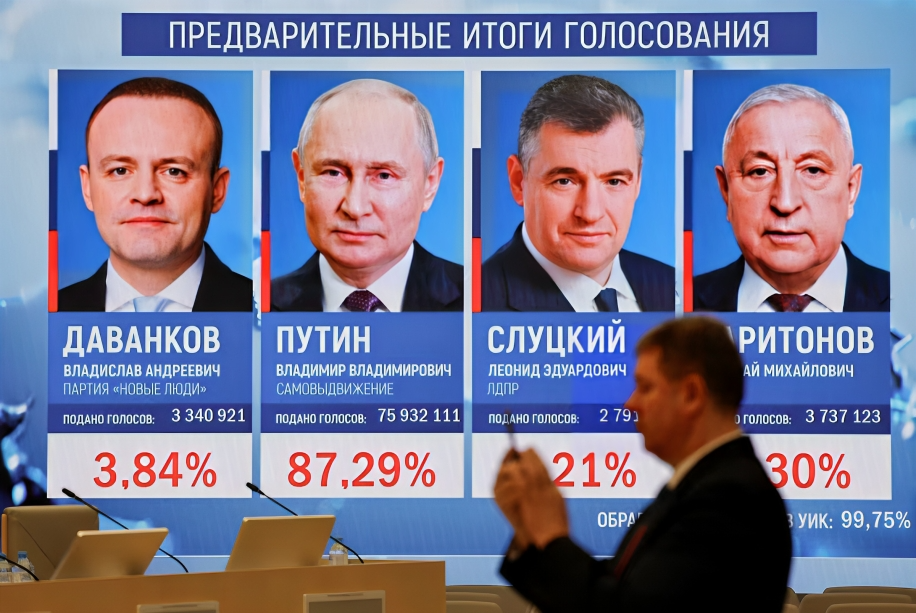A Hollow Victory: Putin Claims Landslide in Russian Election and Scorns US Democracy
The manner of Putin’s win exposes the underlying weakness of the regime. In all practical sense, it was a carefully managed election that would have only one possible outcome. Only Kremlin-tolerated candidates were allowed to stand contest. Those critical of Mr. Putin’s policies were barred on technical grounds. The state had also passed legislation in the election run-up criminalising any criticism of the Ukraine war. For Mr. Putin, who faces international criticism over the war, the election was an opportunity to tell the world that the country was united behind his leadership.

Image Source: Reuters
In a predictable turn of events that shocked not even the recently dead carcass of Russian Democracy, Vladimir Putin has secured another resounding victory in Russia’s recent elections, further solidifying his grip on power for the foreseeable future. The outcome of the March 15-17 elections was a foregone conclusion, with Putin’s victory margin being the only point of speculation. With this win, Putin is set to become Russia’s longest-serving leader in over two centuries, a feat not achieved since the days of Czarina Catherine the Great establishing educational reform, championing the arts, and extending Russia’s borders in the largest territorial gain since Ivan the Terrible. If he has inherited anything, Putin definitely has the territorial ambitions of his industrial-era predecessor.
The Central Election Commission (CEC) of Russia declared Putin the winner with nearly 87% of the vote, leaving his nearest rival, Nikolay Kharitonov of the Communist Party, far behind with only 4.31%. The high voter turnout of 77.44% was touted by Ella Pamfilova, the CEC chief, as a sign of unity under Putin’s leadership.
Putin, a former KGB lieutenant colonel who ascended to power in 1999, has emphasized that this victory sends a clear message to the West: Russia is a force to be reckoned with, whether in times of peace or conflict.
However, international reactions to the elections have been mixed. British Foreign Minister David Cameron criticized the elections, highlighting what he called the “depth of repression” in Russia. Similarly, the US State Department condemned the process as “incredibly undemocratic,” citing the jailing and disqualification of political opponents.

In contrast, messages of congratulations poured in from countries across Asia, Africa, and Latin America, highlighting the divide in global perceptions of Putin’s victory. Chinese state media, for instance, framed Putin’s win as bringing certainty to a world in turmoil, reflecting China’s alignment with Russia amidst strained relations with the US. After Russia began its war against Ukraine, 141 countries voted in favour of a UN resolution condemning the invasion. However, according to the Economist Intelligence Unit (EIU), that headline figure conceals the reality that two-thirds of the world’s population live in countries that were neutral or Russia-leaning. The EIU’s analysis found countries including Brazil, Saudi Arabia, South Africa – and most importantly India – have done their utmost to avoid picking sides in the conflict.
The close ties between Russia and China have only deepened in recent years, with both nations seeking to challenge US dominance on the global stage. Putin’s reaffirmation of support for China’s stance on Taiwan during his victory speech further underscores the alliance between the two nations.
India, too, has maintained a strategic relationship with Russia, particularly in light of recent geopolitical developments. Despite widespread international condemnation of Russia’s actions in Ukraine, India has refrained from taking a strong stance against Moscow. Prime Minister Narendra Modi expressed eagerness to strengthen India’s partnership with Russia, highlighting the importance of their longstanding ties.
India’s role in the global economy, coupled with its status as the largest buyer of Russian oil, has cemented its position as a crucial ally for Moscow. By continuing to support Russia amidst Western sanctions, India has positioned itself as a significant player in shaping the geopolitical landscape of the region.
As Putin embarks on another term in office, his victory in the elections not only solidifies his hold on power but also underscores the shifting dynamics of international relations, with alliances and partnerships playing an increasingly pivotal role in shaping global politics.
Team Profile

- News Writer
- Shubham Chakraborty, a Freelance Writer, holds an MBA from XLRI and boasts 6.5 years of extensive corporate experience. Departing from his corporate path, he embarked on a journey to fulfill his childhood dream of focusing on writing.
Latest entries
 English12 May 2024US Likely to Impose 100% Tariff on Electric Vehicle Imports from China
English12 May 2024US Likely to Impose 100% Tariff on Electric Vehicle Imports from China English26 March 2024UN Security Council Demands Immediate Ceasefire for the First Time Amidst Ongoing Israel-Gaza Conflict
English26 March 2024UN Security Council Demands Immediate Ceasefire for the First Time Amidst Ongoing Israel-Gaza Conflict English23 March 2024Bloodbath in Moscow: ISIS-K Delivers Shocking Blow to Heart of Russia
English23 March 2024Bloodbath in Moscow: ISIS-K Delivers Shocking Blow to Heart of Russia English20 March 2024A Hollow Victory: Putin Claims Landslide in Russian Election and Scorns US Democracy
English20 March 2024A Hollow Victory: Putin Claims Landslide in Russian Election and Scorns US Democracy









